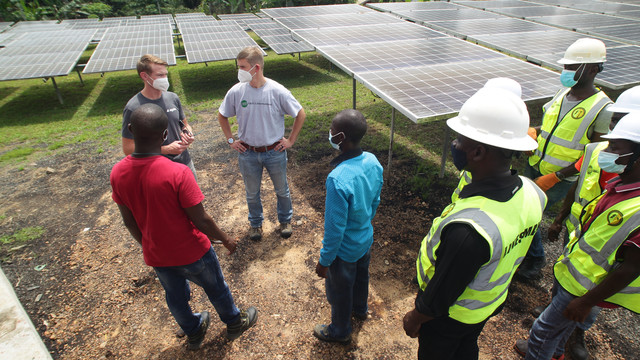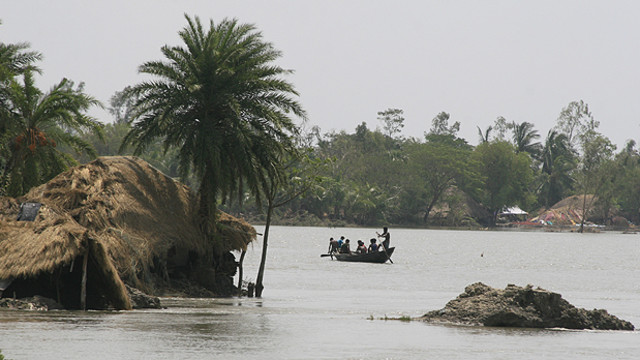In the run up to Nigeria’s April elections the political lobbying, with the usual round of underhand payments for support, has Nigerians hoping for a fairer competition in the grab for power. The political process is being increasingly scrutinised by the average citizen — with record numbers of people registering to vote and self-formed citizens groups promising to monitor polling stations. Another type of power — electricity, or ‘light’ as most Nigerians call it — and the lack of it is one of the hot potato election issues on everyone’s lips.
According to official figures Nigeria produces 21.9 billion kiloWatt hours per year of power. This equates to 162 kiloWatt hours per person per year — of course distributed very unequally. To put this in perspective, that is about 90 times less than usage per capita in the United States, 17 times less than the world average, similar to Bangladesh and triple that of Haiti.
Home grown power
But these figures, which are based on power generated through the national grid, are only the tip of the iceberg. Anyone who has been to Nigeria will be familiar with the constant blackouts and the familiar noisy hum of the generator — the main power source of Nigeria. Generators range from huge diesel units used by big business and large hotels, which sound like an aircraft taking off, to the small petrol generators increasingly being used by some of the poorest rural households.
A recent estimate in the Economist puts two-thirds of all electricity produced in Nigeria as ‘backyard’ generator-based — at a cost of USD $13 billion a year. The generator industry — popularly known as the generator mafia — is a powerful lobby seeking to keep the status quo (interesting article on this and incentives of current electricity workers).
The reality in Nigeria, where public services are often not functioning and corruption is a huge issue, is that individual ownership and self-reliance are king. The norm — encouraged by widely and increasingly cheaply available generators — is individual power generation for those who can afford it. Affordability is now at a level where the 1kW generator, branded as ‘I better pass my neighbour’ — read ‘one-better’ than your neighbour — is seen throughout many rural communities.
The issue for people once they buy a generator is the cost of continuing to feed it fuel. Yet when they can run it, they suddenly have access to many of the energy services enjoyed by the more wealthy — tv, stereo, lighting, fans, fridge/freezers, and so on. And importantly, compared with the unreliable or non-existent grid, they can operate it on their own agenda — self-reliance wins. This culture means sharing of these generators is uncommon — despite the potential to save money and pollute less.
What is the government doing?
Back to power and politics. Power sector reforms have been stalled for a number of years in Nigeria. Plans to privatise the grid and generate competition were introduced with the Electricity Power Sector Reform Act. But the implementation of this law, which like many in Nigeria has vision but lacks the detail required for execution, stalled after the initial step of establishing a holding company for Nigerian power called the Power Holding Company of Nigeria (PHCN) — popularly known as the Power Withholding Co. Most likely, vested interests from the powerful generator lobby have encouraged keeping power sector reforms repressed - plus the vast numbers of employees in the bloated and corrupt PHCN also put strong pressure on keeping the status quo.
There is now a process underway to push the power reforms through — championed by the President. The result is likely to be a UK-style model where a number of private power generators compete to supply customers, with an independent regulator. Yet for the average citizen or lobby group wanting to know, the implementation plans are shrouded in mystery.
The government knows that to attract private sector investment, particularly from international players, the deal will need to be sweet. Questions around how much national infrastructure will be sold off for, what the new structure of the private model (including effective regulation) will look like, how much tariffs will be (big price hikes are expected), and which aspects of these will be enshrined in law remain unclear to the majority.
Then there is the question of all the people who are not on the grid — for some the grid will never arrive. Does the government have new ideas on decentralised power generation or will the ‘pass your neighbour’ individualism continue into the future?
Citizen voice
Citizens of Nigeria are more strongly than ever demanding fairer elections. Building collective trust in political institutions is a slow and difficult process. Equally, in a society where self-reliance is king, building confidence in public goods such as power is challenging — more so than building private sector investor confidence. Perhaps a start with both of these issues is for political parties to have a more open and honest discussion with the public on what vague policy promises like ‘improving the power sector’ mean and how they will be achieved.
Understanding reasons behind policy decisions in power sector reform and being involved in the process will help build acceptance of increased tariffs and trust that it is not just another money-making scheme for big business or corrupt politicians — as well as giving a voice to those not on the grid. If the government is unwilling to have this discussion then maybe now is the time for the current citizen momentum to demand it.
Ben Garside is a researcher in the Sustainable Markets Group.




